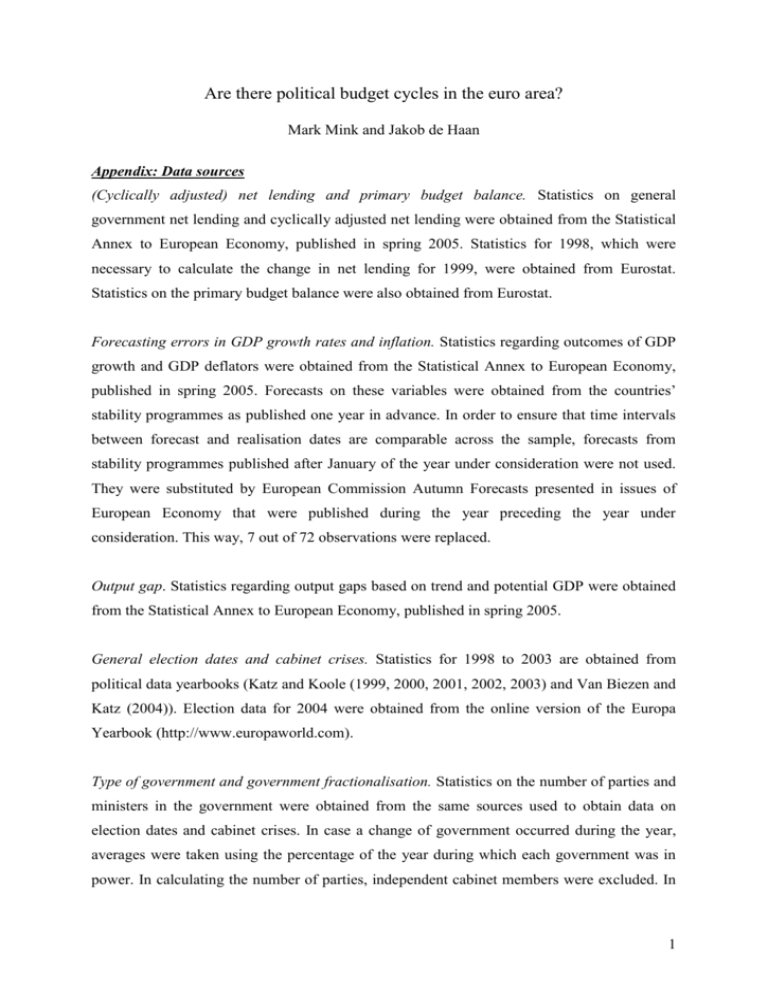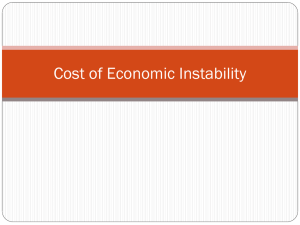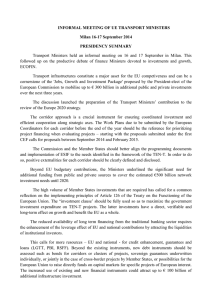Appendix: Data sources
advertisement

Are there political budget cycles in the euro area? Mark Mink and Jakob de Haan Appendix: Data sources (Cyclically adjusted) net lending and primary budget balance. Statistics on general government net lending and cyclically adjusted net lending were obtained from the Statistical Annex to European Economy, published in spring 2005. Statistics for 1998, which were necessary to calculate the change in net lending for 1999, were obtained from Eurostat. Statistics on the primary budget balance were also obtained from Eurostat. Forecasting errors in GDP growth rates and inflation. Statistics regarding outcomes of GDP growth and GDP deflators were obtained from the Statistical Annex to European Economy, published in spring 2005. Forecasts on these variables were obtained from the countries’ stability programmes as published one year in advance. In order to ensure that time intervals between forecast and realisation dates are comparable across the sample, forecasts from stability programmes published after January of the year under consideration were not used. They were substituted by European Commission Autumn Forecasts presented in issues of European Economy that were published during the year preceding the year under consideration. This way, 7 out of 72 observations were replaced. Output gap. Statistics regarding output gaps based on trend and potential GDP were obtained from the Statistical Annex to European Economy, published in spring 2005. General election dates and cabinet crises. Statistics for 1998 to 2003 are obtained from political data yearbooks (Katz and Koole (1999, 2000, 2001, 2002, 2003) and Van Biezen and Katz (2004)). Election data for 2004 were obtained from the online version of the Europa Yearbook (http://www.europaworld.com). Type of government and government fractionalisation. Statistics on the number of parties and ministers in the government were obtained from the same sources used to obtain data on election dates and cabinet crises. In case a change of government occurred during the year, averages were taken using the percentage of the year during which each government was in power. In calculating the number of parties, independent cabinet members were excluded. In 1 calculating the number of ministers, finance ministers or ministers for the budget were excluded. Junior ministers, secretaries of state and ministers to the prime minister were not taken into account either. Government positioning on a left-right scale. Data on party colour were obtained from Benoit and Laver (2005). However, for France data from the Comparative Manifestos Project (Budge et al., 2001) was used, which did not affect the results. In fact, using only the CMP data in constructing the variable leads to identical conclusions. Debt to GDP ratio. Statistics on debt ratios were obtained from the Statistical Annex to European Economy, published in spring 2005. 2











